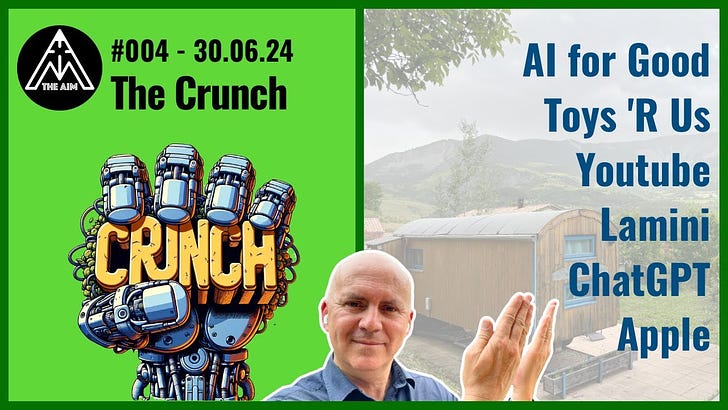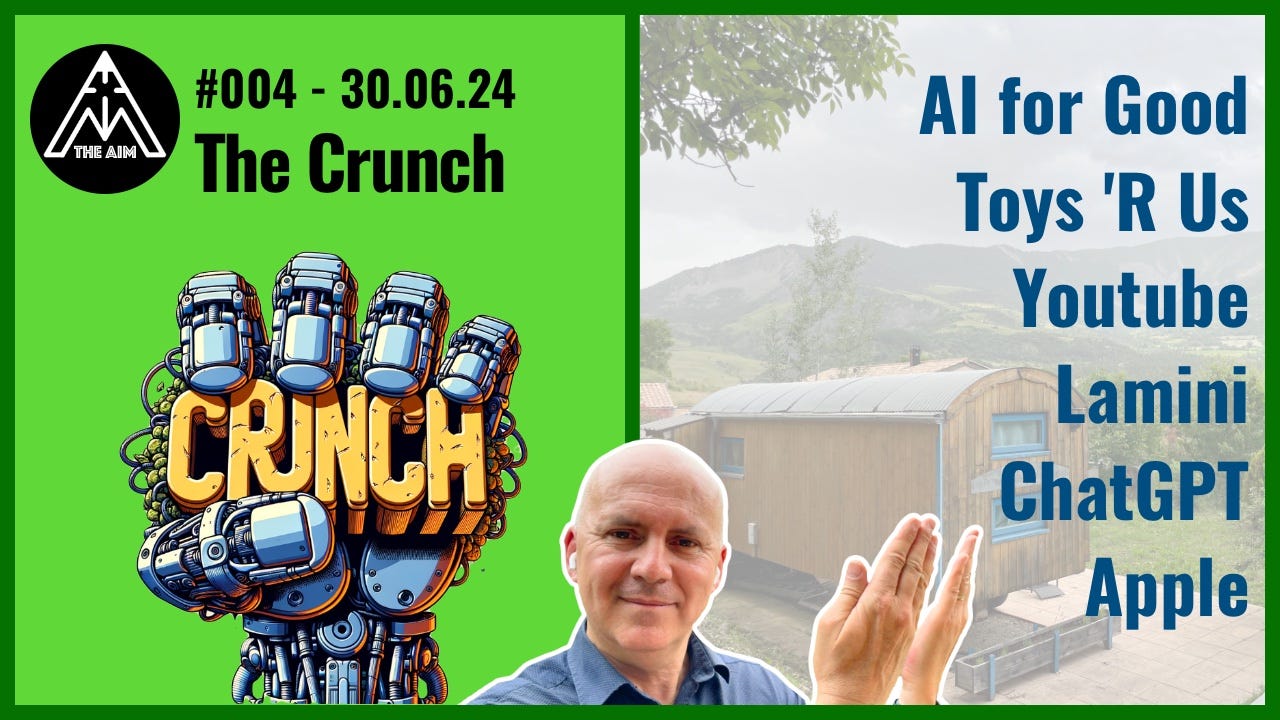AI Revolution: From Magnets to Movies - The Latest Breakthroughs Explained
The AIM 004 - The Crunch
The 30-Second Takeaways
🧲 Material Nexus has developed an AI-designed magnet without rare earth metals, potentially revolutionising industries like electric vehicles and renewable energy. This breakthrough showcases AI's ability to accelerate innovation and reduce environmental impact.
🚀 Leap71 used AI to design a rocket engine in just two weeks, demonstrating AI's potential to dramatically speed up complex engineering processes. This achievement could lead to faster and more efficient development in aerospace and other high-tech industries.
🎥 Toys R Us debuted an AI-generated advertisement at the Cannes Lions Festival, marking a significant milestone in AI-powered content creation. This development signals a potential shift in how marketing and media content may be produced in the future.
🎵 YouTube's approach to record labels for an AI song generator highlights the ongoing tension between AI innovation and intellectual property rights. This situation underscores the need for careful consideration of how AI will impact creative industries.
🧠 Lamini's "memory tuning" technique claims to reduce AI hallucinations by 95%, potentially making AI outputs more reliable and trustworthy. This advancement could expand AI's applicability in critical fields requiring high accuracy.
🤖 A UC San Diego study found that GPT-4 was mistaken for a human 50% of the time, illustrating how advanced AI has become in mimicking human conversation. This raises intriguing questions about the future of human-AI interaction.
🍎 Apple's strategy to integrate multiple AI models into its ecosystem while emphasising privacy showcases a user-centric approach to AI adoption. This move could significantly influence how AI is implemented in consumer technology.
Welcome to The AIM - the Augmented Intelligence Monitor. In this edition, we'll delve into the most recent developments in artificial intelligence, from groundbreaking technological achievements to the evolving media landscape. Join us as we explore how AI is reshaping various industries and consider its potential impact on our future.
Mentions in this Article
🌏 Nexus Materials: https://www.materialsnexus.com/news/magnex-rare-earth-free-permanent-magnet
🌏 Leap 71: https://leap71.com/2024/06/18/leap-71-hot-fires-3d-printed-liquid-fuel-rocket-engine-designed-through-noyron-computational-model/
🌏 Toys R Us Studios: https://www.toysrus.com/pages/studios
🌏 YouTube and labels: https://arstechnica.com/ai/2024/06/youtube-tries-convincing-record-labels-to-license-music-for-ai-song-generator/
🌏 Lamini AI: https://www.lamini.ai
🌏 ChaGPT study: https://www.techradar.com/pro/ahead-of-the-launch-of-gpt-5-another-test-shows-that-people-cannot-distinguish-chatgpt-from-a-human-in-a-conversation-test-is-it-a-watershed-moment-for-ai
AI for Good: Revolutionising Technology and Engineering
Materials Nexus: A Game-Changer in Magnet Production
One of the most exciting recent developments comes from Materials Nexus, a UK-based startup that's revolutionising the world of magnets. Using AI, they've developed a new magnet called Magnex that doesn't require rare earth metals. This is a significant breakthrough, as rare earth metals are crucial to many technologies but pose serious environmental concerns due to their extraction processes.
The AI platform used by Materials Nexus analysed over 100 million compositions in record time, a feat that would have taken years, if not decades, using traditional methods. The result is a magnet that's not only more environmentally friendly but also more cost-effective. This innovation could be a game-changer for industries such as electric vehicles and renewable energy.
Leap71: Accelerating Rocket Engine Design
In a similar vein of AI for good, Dubai-based AI engineering firm Leap71 has made impressive strides in rocket engine design. Using their AI model called Noyron, they designed a rocket engine in just two weeks - a process that typically takes months or even years.
The AI-designed engine was 3D-printed and successfully tested from the get-go. Noyron was used to model better fuel mixing and solve complex engineering problems in a fraction of the time it would take human engineers. This achievement highlights the potential of AI in accelerating innovation and problem-solving in the field of engineering.
AI in Media: Transforming Content Creation and Distribution
Toys R Us: Pioneering AI-Generated Advertising
The media industry has also seen remarkable AI advancements, with Toys R Us making waves by debuting an AI-generated film at the Cannes Lions Festival. Using OpenAI's Sora, they created a 66-second promo featuring the company's founder and mascot.
This marks the first time a major brand has showcased the potential of AI in video production to this extent. The quality of AI-generated content is so high that it's becoming increasingly difficult to distinguish from reality. While reactions have been mixed, with some finding it fascinating and others calling it "creepy", it undeniably demonstrates the potential of AI in revolutionising content creation.
YouTube's AI Song Generator: A New Frontier in Music Production
YouTube has been approaching record labels to license their catalogues for a new AI song generator. This move has sparked intense debate in the music industry, raising questions about copyright, artist rights, and the future of music creation.
While YouTube's approach of seeking permission before using the content is commendable, it's unclear how artists will react to the prospect of AI-generated music potentially competing with their work. This development highlights the ongoing tensions between AI innovation and the need to protect intellectual property and artists' rights.
Advancements in AI Reliability and Human-AI Interaction
Lamini: Reducing AI Hallucinations
California-based startup Lamini is tackling one of the biggest challenges in AI: reducing hallucinations in Large Language Models (LLMs). They've developed a technique called "memory tuning" that claims to reduce hallucinations by 95% - a significant improvement over traditional methods like prompt engineering and RAG (Retrieval-Augmented Generation).
If effective, this could be a major step forward in making AI outputs more reliable and trustworthy, potentially expanding the use of AI in more critical applications.
UC San Diego Study: Can Humans Distinguish AI from Human Conversation?
A recent study from the University of California, San Diego's Department of Cognitive Sciences, explored how well people can distinguish between AI and human conversation partners. The results were eye-opening: GPT-4 was mistaken for a human about 50% of the time, which is better than chance.
This study demonstrates how far AI has come in mimicking human conversation and raises intriguing questions about the future of human-AI interaction. As AI continues to evolve, we may soon reach a point where AI assistants on our devices can engage in natural conversations that are indistinguishable from human interactions.
Apple's AI Strategy: Integration and Privacy
Apple is making significant moves in the AI space with its Apple Intelligence initiative. The company is reportedly in talks with several major AI companies, including Google and Anthropic, to integrate various AI models into its ecosystem.
This strategy aims to provide users with a choice of AI models for different use cases, all while emphasising privacy. Apple's approach to delivering AI outcomes on-device and ensuring personal data remains under control sets it apart in the industry.
While the financial implications of these potential partnerships are yet to be clarified, this move could significantly expand the distribution of AI products and services to millions of Apple users worldwide.
Conclusion
As we've seen, AI is rapidly advancing across various sectors, from engineering and technology to media and personal computing. These developments promise to revolutionise how we work, create, and interact with technology. However, they also raise important questions about privacy, intellectual property, and the future of human-AI relationships.
As we move forward, it's crucial to stay informed about these advancements and consider their implications. Whether you're a technologist, an artist, or simply an interested observer, understanding these developments will be key to navigating our AI-augmented future.
Until next time, stay curious and stay informed. The world of AI is evolving rapidly, and there's always something new to discover.
Thanks and acknowledgements
This Podcast was produced with passion and love in green Geneva, Switzerland. It is proudly sponsored by Valeris Coaching, and primarily produced and delivered by senior coach Lucas Challamel, as part of his YouTube channel, The Camel Hall.
https://poe.com/Claude-3-Opus, contributed to brainstorming and as a sounding board for some conceptual propositions.
The video was patiently edited with the free version of CapCut, including sound fx, stickers and automated captions (Such a great feature!)
THE AIM: Navigating the Philosophical Frontier of Augmented Intelligence 🧭
Join Lucas Challamel, a veteran tech leader and CTO, as he guides you through the existential questions raised by the rapidly evolving world of artificial intelligence (AI). This is not just another podcast about the technical nitty-gritty — THE AIM dives into the profound implications AI will have on our lives, businesses, and society as a whole.
🌊 AI’s Disruptive Wave
From OpenAI to Google, the AI revolution is swiftly crashing upon us in an unstoppable wave of innovation and disruption. Billions are being invested as tech titans race to develop ever-more-powerful AI systems. But are we truly prepared for the philosophical ripples this tidal force will send through industries, governments, and communities worldwide?
📜 The Next Chapter in Human Intelligence
Throughout history, groundbreaking innovations like the printing press, the Industrial Revolution, and the computer age have radically reshaped civilisation’s trajectory. Now, AI represents the next seismic reinvention of intelligence itself.
Just as Gutenberg’s press democratised access to information, AI promises to democratise human knowledge and creativity on an unprecedented scale. This AI-powered rebirth will make intelligence universally accessible like never before — a revolutionary force that both inspires awe and demands careful examination.
💡 Illuminating the “Dreaming Machines”
Let’s be clear — today’s AI is not sentient like biological intelligence. These systems are more akin to hyper-advanced “dreaming machines” that generate plausible outputs by recognizing patterns in vast datasets, similar to how our sleeping minds weave dream imagery from our experiences.
While incredibly powerful, today’s AI lacks human capacities for reason, emotional intelligence, and open-ended innovation…for now. But even at this stage, AI raises profound questions. How will these “dreaming machines” impact education, creative industries, and our collective sense of reality?
🧠✨ Augmenting Human Potential
Rather than replacing us, AI’s ultimate potential may lie in augmenting human intelligence as a complementary tool. Imagine having a personal AI assistant to access the world’s skills and knowledge on demand. Or leveraging AI simulations to solve complex multivariable challenges. Or customized AI tutors tailoring lessons to each student’s unique needs.
By amplifying our natural abilities, AI can uplift the entire scope of human potential, accessibility, and achievement. Open-source AI initiatives hint at a future where these augmentation capabilities are available not just to big tech, but to everyone.
⚖️ Navigating AI’s Ethical Implications
Of course, realising AI’s promise will require carefully navigating a minefield of ethical landmines around privacy, surveillance, job displacement, IP rights, disinformation, and more. As AI blurs the lines between real and artificial, truth and fiction, we must develop guidelines to wield this power responsibly.
THE AIM brings a human-centric, philosophical perspective to these challenges. Through expert interviews, deep dives, and open discussions, we’ll cut through the hype to explore how best to cultivate AI as a force for individual empowerment and positive global impact.
💥 Embrace the Future of Intelligence
So brace yourself for a mind-expanding journey into AI’s profound existential frontier. Whether you’re a tech innovator, business leader, student, or just intensely curious about the future of intelligence, THE AIM is your guide through both the awe-inspiring possibilities and risks that await.
Join us as we celebrate humanity’s unbounded potential for creativity, empathy and growth — because even as we augment ourselves with AI’s power, our unique strengths as a species will remain indispensable.
Buckle up and get ready to dream alongside the “dreaming machines!” The AI revolution is coming…and Lucas Challamel’s THE AIM will prepare you for its world-shaping impact.
#AI #ArtificialIntelligence #AIPodcast #TechPodcast #FutureTech #EmergingTech #Innovation #Disruption #AugmentedIntelligence
#PhilosophyofAI #ExistentialAI #Ethics #TechEthics #Futurism #Singularity #DreamingMachines #GenerativeAI #LargeLanguageModels





